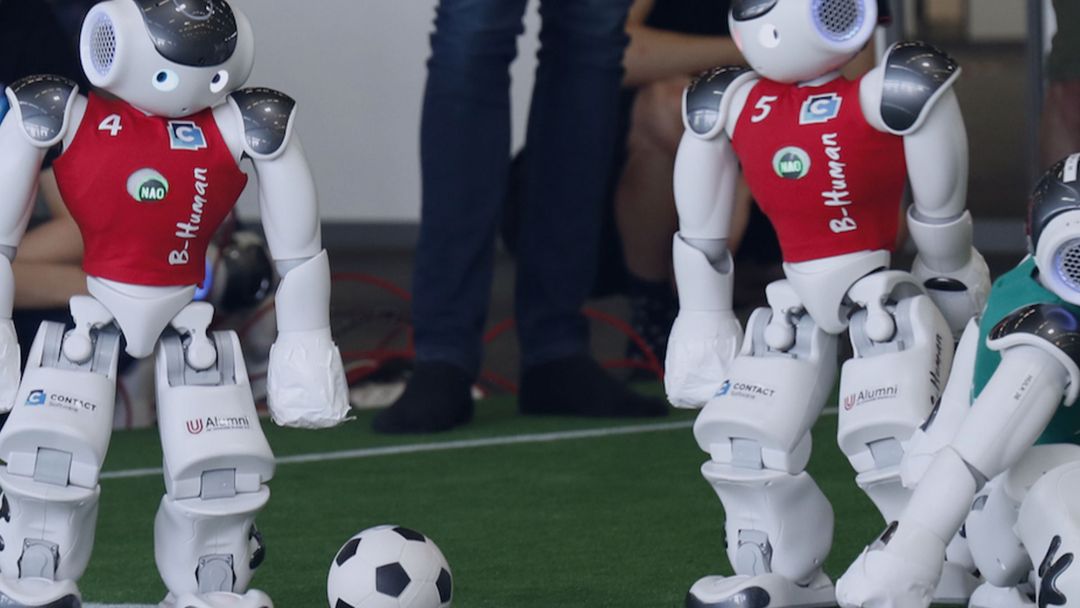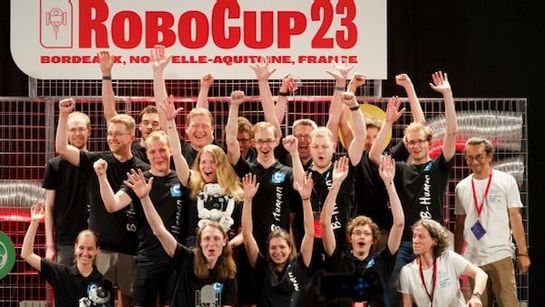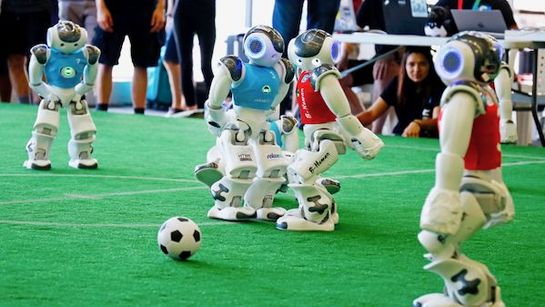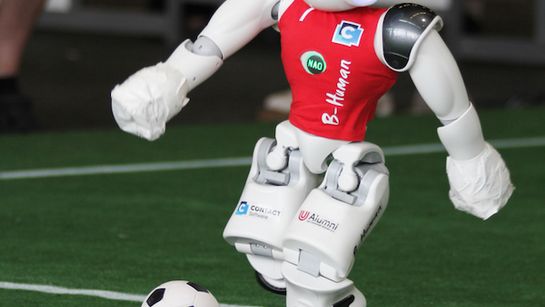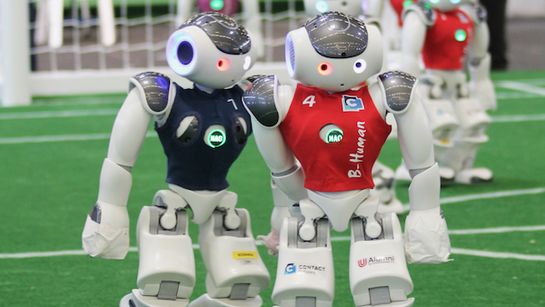Stronger than ever before B-Human defended last year’s title at the RoboCup in Bordeaux. The Bremen-based team won the final against HTWK Robots from Leipzig with a final score of 9:0. With a total of 76 goals in eight games and zero opposing goals, five of the eight games were ended prematurely due to the so-called mercy rule, which applies when the goal difference is 10:0. Due to this outstanding result, B-Human is considered the most successful team in the RoboCup Standard Platform League (SPL) by far.
All teams participating in the SPL play with the same robot model, namely the humanoid NAO by Softbank Robotics albeit with different software. The league is divided into two sub-leagues, the Champions Cup, in which B-Human competes, and the Challenge Shield, which is roughly equivalent to the first and second Bundesliga (premier league). Once the competitions are completed, the team from Bremen will make its algorithms available as open source so that other teams can benefit from them. The top three teams in the Challenge Shield, RoboEireann from Ireland, R-Zwei Kickers from Kaiserslautern and BadgerBots from the U.S., all used software released by B-Human over the past two years in this year's competition.
The secret to success of the Bremen robot soccer players
The unprecedented success of the Bremen team is the result of its superiority in numerous research areas. For example, the B-Human robots had no difficulty whatsoever in operating under the influence of changing light conditions, which may result from playing near windows. Bremen's NAOs know their exact position on the field, which enables them to play a precise passing game that no other team in the league is capable of. They also recognize other players accurately enough to shoot between them or sneak past them. In addition, B-Human's robots are less likely to fall over than the competition's NAOs, as their running movements can compensate for most physical contacts with other robots. Last but not least, they are able to shoot accurately from a running position in many situations, which makes most passes possible in the first place.
B-Human dominates the Technical Challenges
In addition to the actual soccer competition, the so-called Technical Challenges were also held this year. These competitions explore possible future rule changes in order to reach the overriding goal of the RoboCup: a team of humanoid robots should be able to win against the reigning human soccer world champion according to official FIFA rules by 2050. Until then, the difficulty levels of the Technical Challenges increase every year.
For the first time, two of the three Technical Challenges were held as part of the regular soccer games. For example, one competition challenged the teams to minimize the data exchange via wifi between the robots during the games, which is aimed at introducing audio communication in the future, among other things. Another competition was based on a challenge from the previous year: Here, the robots had to recognize referee gestures, but, unlike in 2022, in regular soccer play, each immediately after a whistle. The third competition was also based on a challenge from last year: In the presence of three opponents, the teams had to play a double pass and then score a goal. B-Human was the only team to succeed in this task, scoring in all three attempts. Overall, the team scored 74.5 out of a possible 75 points in the three competitions.
More than collecting titles and trophies
To date, the team has won the world championship ten times as well as thirteen regional championships. But B-Human is about more than just collecting titles and trophies: As a project study program at the University of Bremen, it introduces students to the development of software in an application-oriented manner and enables them to work intensively and independently on self-selected issues related to robot soccer over the course of several semesters. The scientific publications "Dynamic Joint Control For A Humanoid Walk" and "Neural Network-based Joint Angle Prediction for the NAO Robot" resulted from the work on the NAO's walking movements. The team members Philip Reichenberg, Thomas Röfer, Jan Fiedler and Tim Laue presented these papers at this year's RoboCup Symposium, which traditionally marks the end of the RoboCup.
Currently, B-Human consists of 13 students from the University of Bremen and one former student. The team is supervised by scientists Dr. Thomas Röfer from the DFKI research department Cyber-Physical Systems, which is headed by Prof. Dr. Rolf Drechsler, and Dr. Tim Laue and Arne Hasselbring from Prof. Dr. Udo Frese's Multisensory Interactive Systems research group at the University of Bremen. CONTACT Software, the leading provider of solutions for product process and digital transformation, has been the team's main sponsor since 2017.
More information:
RocoCup SPL YouTube channel
Official website of RoboCup 2023
Team B-Human website
B-Human auf Twitter
B-Human on Facebook
B-Human on Instagram
Website of the DFKI research department Cyber-Physical Systems

